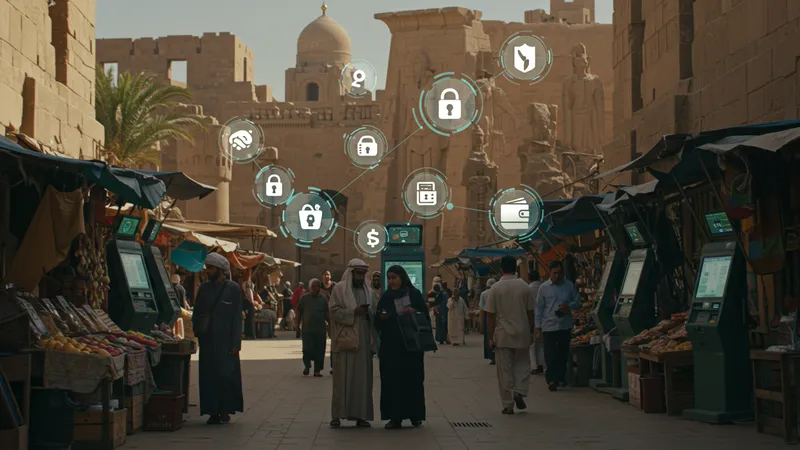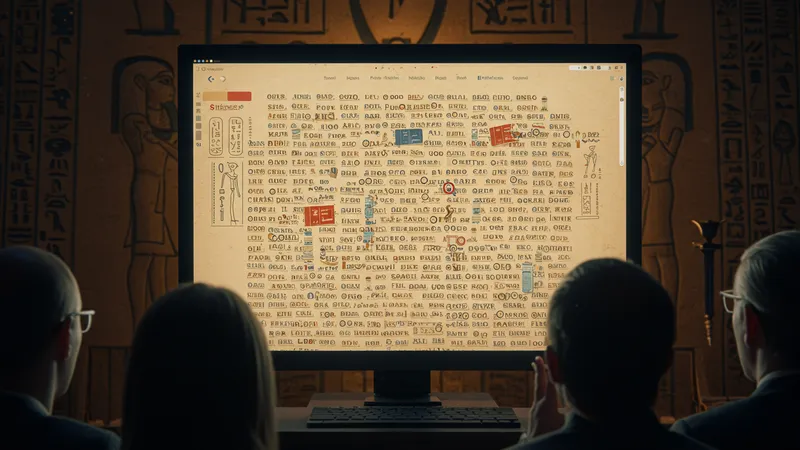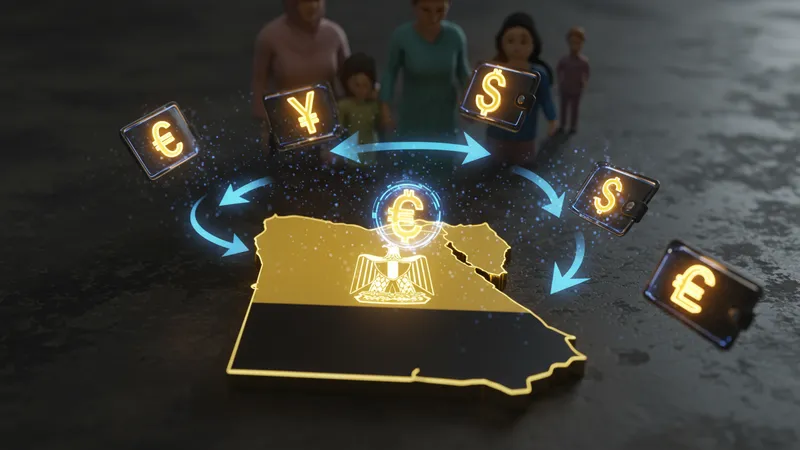How secure are your transactions when using digital wallets in Egypt? Surprisingly, traditional banking and physical cash may no longer be the safest options. Shocking new stats about digital wallets will make you rethink everything.
Amid rapid technology advancements and increased internet penetration, Egypt has become a hotbed for digital payments evolution. Understanding which wallet to trust is crucial as digital heists are rising faster than ever.

What if I told you that your favorite e-wallet could be mistakenly diverting part of your funds, and no one knows the cause? It sounds unbelievable, but many users have reported mysterious deductions and lack of transparency from service providers. But that’s not even the wildest part…
Digital wallets are marketed as the magic solution to speed up transactions, but few know that their data privacy standards vary dramatically. Uganda might have comparable privacy rules, yet Egypt’s approach could rock the foundations of your trust in digital finance. What happens next shocked even the experts…

In a recent exposé, security researchers unveiled vulnerabilities in some of Egypt's most popular digital wallets. This revelation has sent shockwaves across the financial tech sector, questioning whether your personal data is truly safe. These flaws include outdated encryption protocols and poorly secured backup processes. To make matters worse, these issues are often glossed over by wallet companies themselves.
Security experts emphasize that these vulnerabilities could easily be exploited by cybercriminals. The tricky part is that users are often unaware of these risks, making them sitting ducks for sophisticated scams. But there’s one more twist: many users unknowingly engage in risky behavior—such as reusing passwords—which exacerbates the situation.
Avoid getting caught in this digital crossfire by taking proactive measures. Simple strategies like enabling two-factor authentication and routinely updating your app settings can offer a significant security boost. Yet, that’s merely scratching the surface, as deeper issues remain hidden in the backend processes.
There’s more: regulatory bodies in Egypt are scrambling to adapt policies for digital security, but they constantly play catch-up. When you think you know everything, further complexities unfold. What you read next might change how you see this forever.

Transaction fees might seem straightforward, but hidden charges are a significant part of Egypt’s digital wallet ecosystem. Often, users aren’t informed about these opaque fee structures until it's too late. Imagine paying a higher fee for using a service that promised to be cost-efficient; it's a harsh wake-up call for many.
Wallet providers often display a list of fees in a way that's hard to decipher, making it easy to overlook critical details. More alarmingly, fees can fluctuate based on usage frequency, creating a tier-based system that’s almost impossible for the average user to predict. But here's the kicker: these fees can significantly erode small transactions.
It's crucial to review the terms and conditions of these digital wallets meticulously. You'd be amazed by what’s hidden in the fine print—clauses that shield providers from accountability when fees increase unexpectedly. And here’s where it gets even trickier: different wallets have significantly varying fee structures.
You may find yourself comparing costs across multiple providers to find the best deal, but the landscape is ever-changing. Regulatory pressures might normalize fees, but as users, constant vigilance is the only defense. You'll never guess what some users discovered deep within these terms…

User-friendly interfaces have always been a digital wallet's selling point, yet not all deliver on this promise. With options galore in Egypt, you'd think they have usability nailed down. On the contrary, cryptic navigation pathways often baffle users, leaving them more confused than before.
The allure of an intuitive design quickly fades when you're stuck in a loop trying to complete a basic transaction. Some apps overcomplicate what should be a seamless experience, making you question whether this convenience is merely skin-deep. Anyone can relate to the frustration of unintuitive design masking as generational tech advancement.
You may not know this, but real-time assistance lags in many popular e-wallets. And if you think in-app FAQ sections would suffice, they often end up being a compilation of vague, non-answers. More surprising is that this lack of clarity cuts across most platforms, raising serious questions about customer service priorities.
Imagine trying to navigate this labyrinth while tackling unmet tech-expectations. As Egyptian users grow digitally savvy, they demand more accountability and user-centric designs. What comes next is a lesson in the unexpected shortcomings of some highly-lauded apps…

While we laud digital wallets for their convenience, offline transactions still hold a surprising place in Egypt’s payments ecosystem. Following the recent backlash against digital fees and privacy breaches, some consumers are reverting to cash and bank transfers. This retreat underscores skepticism, revealing that the digital shift isn’t as complete as some experts had believed.
Why does cash remain king in certain regions? Trust plays a significant role. People feel more in control when physically handling their money. Furthermore, beyond the city centers, internet access can be irregular, making offline transactions the more reliable option in such scenarios.
This duality between digital and offline payment methods serves as a cautionary tale: over-reliance on technology could leave you stranded in unforeseen situations. The interesting part is how vendors adapt, maintaining both digital and cash operations to cater to every customer preference.
What you read next might just redefine your understanding of financial adaptation in emerging markets. But there’s much more hidden behind Egypt's mixed payment dynamics that's yet to be uncovered…

Here’s a not-so-fun fact: you could be paying way more than you think for the privilege of digital payments in Egypt. While attention is frequently on explicit transaction fees, few focus on the draining costs of data charges and time lost due to tech glitches. These hidden expenses can add up quickly, turning a cheap convenience into a costly habit.
Digital wallets require constant connectivity to function smoothly. If you didn't count on higher internet usage charges, you’re not alone. For many, the trade-off for digital convenience is a more swollen data bill. What’s surprising is how many users aren’t aware of this financial leak.
Even more frustrating from a user’s perspective is the resolution time needed to fix technical issues. Your valuable time spent seeking help over buggy interfaces or resolving error codes could significantly add to the cost. It’s an all-too-common woe that few initially expect.
If these back-end setbacks sound like a deal-breaker, remember there’s more to uncover. But here’s a hint: understanding these hidden costs might save you more than money; it could prevent you from making ill-informed financial decisions.

In the fast-paced universe of digital payments, regulations frequently lag. Egypt's digital wallet revolution is no exception. Navigating these regulatory murkiness presents challenges that many users aren’t even aware exist. From ambiguous data protection norms to incomplete consumer protection laws, there’s significant catching-up for legislators to do.
Enlightening as it is, it's disconcerting to uncover the regulatory vacuum that fails to address intricate digital transactions. Users find themselves in precarious positions, reliant on privacy policies that could shift without notice. Oversight mechanisms remain overstretched, unable to keep up with rapid innovations.
In this whirlwind, many are left asking: who’s really watching out for them? Still, local regulatory bodies make appearances, holding public consultations to gather user concerns. Yet, progress is slow, and not all voices are heard, leading to skepticism regarding effective oversight.
It’s a convoluted battle to harmonize innovative technology with regulatory frameworks. One that might take longer than anticipated. But here's the reality: there’s more hidden behind these regulatory ambiguities, waiting to shock users who thought the digital space was bulletproof.
We often hear about the drawbacks, but digital wallets also serve as powerful tools in broadening financial inclusion in Egypt. The untapped potential for breaking traditional barriers to banking services is immense. Millions of Egyptians who previously had no access to formal banking now find themselves at the center of a financial revolution.
Rural areas, in particular, reap the benefits as traditional banks seldom serve remote populations. Digital wallets empower these communities by offering them vital financial services, often for the first time. As a result, they now participate more fully in the economy, making financial inclusion not just a buzzword but a tangible reality.
Interestingly, this democratization of financial services is spearheaded by both established telecom players and fintech startups. Their groundbreaking initiatives mark a significant shift from exclusion to inclusion. However, bridging this gap is more complex than it seems at first glance.
This progress is promising, but the journey isn't without roadblocks. But there’s so much more to financial inclusion that we’re just beginning to unfold, carrying implications far beyond economic empowerment.

Loyalty programs often sound great on paper, but how effective are they when you dig deeper? Digital wallets in Egypt offer various point systems and rewards, yet the true value of these programs is debatable. The reality could be masking a surprising trap for unwary users.
The allure of earning "points" can sometimes overshadow their actual utility, as redemption often requires jumping through hurdles. Many users have expressed frustration over hidden terms that make redeeming rewards more of a hassle than a benefit. Yet, these loyalty offers persist, seemingly tailor-made for market capture rather than genuine user benefit.
Do these features really translate to consumer savings, or are they mere puffery, dressing up a fundamentally low-value offering? That's a question many are asking as the gap between expectation and reality continues to widen. Those who think they’re saving might be in for a rude awakening.
As promotions become increasingly flashy, it's easy to lose sight of true benefits versus manipulated enthusiasm. But there’s critical insight yet to unfold regarding these loyalty mechanisms. Get ready to discover what your favorite wallet hides behind attractive offers…

Everyone loves a good deal, but are you reading the fine print? In Egypt, digital wallets come with terms so intricate that they’re often misunderstood, if not outright ignored. This oversight can lead to shocking surprises, as users unknowingly commit to unfriendly terms.
Legal terminologies, often described in complex jargon, obscure critical details about fees, privacy, and obligations. Even well-informed users might miss these vital details due to their buried placement within endless clauses. The result? Situations where customers realize too late that their protections are limited.
More intriguing is how this apparently deliberate opaqueness seldom discourages users from signing up. One might wonder, are we so enamored by the convenience that we forget to secure our rights? Sadly, many find themselves unarmed when disputes arise due to unclear terms.
Yet, understanding this fine print is not merely precautionary; it should be a foundational practice. What you uncover next about contract clauses and legal safety nets could transform your digital financial practices forever.

Surprised to learn that digital wallets might be contributing to environmental degradation? With rising usage trends in Egypt, the e-waste generated by discarded digital devices poses a significant ecological concern. As consumers, we’re inadvertently participating in this less-visible cycle of technology waste.
These sleek, indispensable gadgets that facilitate digital payments also have a hidden environmental cost. Many of their components include toxic substances that, when improperly disposed of, harm ecosystems. Few personal finance discussions acknowledge this pressing issue.
Think again if you assumed the digital shift was entirely ‘green’. Adoption of digital wallets may reduce paper bills, but we're replacing them with electronic waste issues. Notably, growing consumer awareness is stirring conversations about eco-friendly tech solutions.
Before you click 'pay now', consider the broader impact of your digital choices. You’ll soon discover surprising industry secrets about sustainability in digital payments—secrets that could change your perspective completely.

International transactions have long been a cash cow for banks, laden with hefty fees. However, Egypt's digital wallet scene is flipping the script. They offer a fresh and far-reaching approach to cross-border money transfers, shaking the very core of conventional banking models.
Digital wallets now enable faster, cheaper, and more straightforward international transfers. This is transformative, especially for expatriates and mixed households who send remittances home. But here's a captivating twist: these alternatives balance accessibility with rules and fees that remain virtually invisible initially.
Aside from economic perks, these transactions further global community connections. Families, entrepreneurs, and freelancers enjoy newfound freedom that’s not restrained by geographical borders. Nevertheless, the convenience comes with its own set of challenges and bewildering hurdles that few foresee.
What becomes apparent is that the digital realm balances opportunity and intricacy—sometimes heavier on the latter. The international payment landscape has never looked so inviting, but when boiled down, you’ll want to consider additional astonishing factors. Do they hold the key to a financial paradigm shift? Only time will tell…

Artificial Intelligence and Machine Learning now play a pivotal role in refining e-wallet functionalities in Egypt. These technologies promise to elevate user experiences by learning and adapting to user behavior, perhaps more than you’d expect.
From fraud detection algorithms to predictive analytics, their integration isn’t just innovative—it’s groundbreaking. E-wallets use these tools to quickly identify anomalies and thwart potential scams, dramatically increasing user trust and satisfaction. The catch? These systems require constant data input, often raising privacy concerns.
However, not all digital wallets harness this technology to its full potential. Some are still optimizing, while others offer advanced features that have turned them into market leaders. Yet, complete transparency remains elusive, feeding a complex dance between user benefits and their expectations regarding privacy.
Who doesn’t love added protection, especially if delivered with user-friendliness? But if you’re expecting complete peace of mind, prepare for a stark awakening regarding digital privacy. More revelations are buried within these innovative yet complex safety features.

The rise of digital wallets in Egypt marks a complicated era of transitions in everyday commerce. Overlooking the vulnerability, contention, and convenience they bring can lead to unnecessarily tumultuous experiences. Yet, within these challenges lies an extraordinary opportunity to shape financial futures positively.
Understanding your choice of digital wallet goes beyond superficial comparisons. Assess security, fees, functional ease, environmental responsibility, and legal stipulations meticulously. This holistic understanding could redefine your financial dealings significantly and ensure safer, smarter usage.
Exciting advancements prompt us to not merely adapt but to steer evolution conscientiously. As you consider this intricate world of digital finances, share your insights and explore these realms with friends and family. Your informed voice could instigate critical discussions and empower more conscious adoption. Stay ahead of the curve, and be part of the solution for Egypt’s digital economy. Why not start a conversation today?